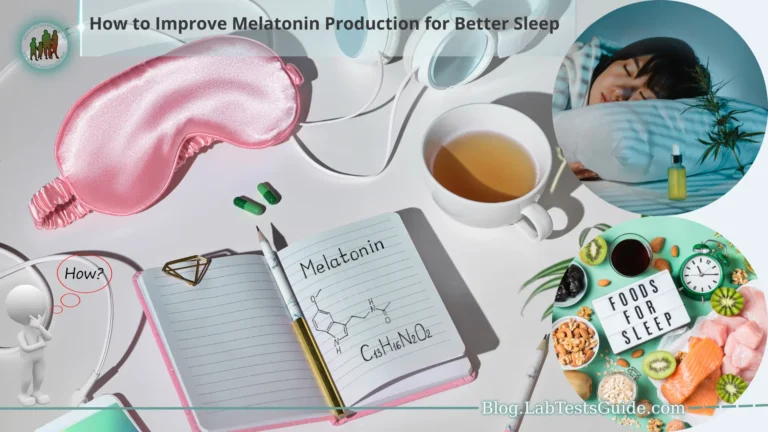Growth hormone (GH), also known as somatotropin, is a peptide hormone produced by the pituitary gland in the brain. It plays a crucial role in stimulating growth, cell reproduction, and regeneration in humans and other animals. The production and secretion of growth hormone are regulated by a complex interplay of various factors.

The regulation of growth hormone production is vital for maintaining proper growth and development throughout life. Imbalances in growth hormone levels can lead to medical conditions such as growth hormone deficiency, gigantism, or acromegaly. Therefore, understanding how to regulate growth hormone production is essential for overall health and well-being.
What is Growth Hormone Regulation and Why is it Important?
- Growth hormone regulation refers to maintaining appropriate levels of growth hormone in the body.
- Growth hormone is crucial for growth, cell reproduction, and regeneration.
- It plays a role in bone and muscle growth, metabolism, and tissue repair.
- Proper growth hormone levels are essential for normal growth and development during childhood and adolescence.
- In adults, growth hormone helps maintain body composition, muscle mass, and bone density.
- Imbalances in growth hormone can lead to conditions like growth hormone deficiency, gigantism, and acromegaly.
- Growth hormone deficiency in children can cause stunted growth, while in adults, it can lead to decreased bone density and muscle mass.
- Gigantism is characterized by excessive growth, and acromegaly involves abnormal growth in certain body parts.
- Regulating growth hormone production is important for preventing these conditions and maintaining overall health.
- It involves understanding factors affecting growth hormone production, diagnosing imbalances, and implementing interventions.
- Optimizing growth hormone levels supports healthy growth, development, and physiological functions.
- Proper growth hormone regulation enhances body composition, overall well-being, and quality of life.
How to Regulate Growth Hormone Production: Strategies and Techniques:
Here are some approaches that can help in this process.
Adequate Sleep:
- Get sufficient and quality sleep on a regular basis.
- Aim for 7-9 hours of uninterrupted sleep each night.
- Growth hormone is primarily released during deep sleep stages.
Regular Exercise and Physical Activity:
- Engage in both aerobic exercises and strength training.
- High-intensity interval training (HIIT) can stimulate growth hormone release.
- Aim for at least 150 minutes of moderate-intensity aerobic activity per week.
Balanced Nutrition:
- Consume a well-rounded diet with a focus on nutrient-dense foods.
- Include high-quality proteins, healthy fats, and complex carbohydrates.
- Ensure adequate intake of vitamins and minerals, especially vitamin D and zinc.
Stress Management:
- Practice stress-reduction techniques such as meditation, deep breathing, or yoga.
- Chronic stress can disrupt growth hormone production, so prioritize relaxation.
Intermittent Fasting:
- Consider implementing intermittent fasting protocols.
- Short-term fasting can increase growth hormone secretion during fasting periods.
Avoid Excessive Sugar and Insulin Spikes:
- Limit intake of sugary foods and beverages.
- High insulin levels can inhibit growth hormone production.
Maintain a Healthy Body Weight:
- Aim for a healthy weight range through balanced nutrition and regular exercise.
- Obesity and excess body fat can impair growth hormone production.
Consult with a Healthcare Professional:
- If you suspect growth hormone imbalances, consult with an endocrinologist.
- They can provide appropriate medical interventions if necessary.
Factors Affecting Growth Hormone Production:
Here are some key factors that affect growth hormone production.
Age:
- Growth hormone production is highest during childhood and adolescence.
- Production gradually decreases as a person ages.
- Aging adults may experience a decline in growth hormone levels.
Sleep:
- Growth hormone is primarily released during deep sleep stages, especially during the first hours of sleep.
- Inadequate or disrupted sleep can affect growth hormone production negatively.
Exercise:
- Regular physical activity, especially high-intensity exercises, can stimulate growth hormone secretion.
- Strength training and resistance exercises have shown to have a positive impact on growth hormone levels.
Nutrition:
- Adequate nutrition is essential for optimal growth hormone production.
- Consuming a balanced diet with sufficient proteins, healthy fats, and carbohydrates supports growth hormone synthesis.
- Specific nutrients like arginine, glutamine, and ornithine may stimulate growth hormone release.
Stress and Emotional Well-being:
- Chronic stress can inhibit growth hormone production.
- Elevated cortisol levels, a stress hormone, can suppress growth hormone secretion.
- Emotional well-being and stress management techniques can positively impact growth hormone regulation.
Medical Conditions and Medications:
- Certain medical conditions, such as pituitary disorders or tumors, can affect growth hormone production.
- Some medications, such as corticosteroids, can also influence growth hormone levels.
Gender:
- Growth hormone production is generally higher in males during puberty compared to females.
- Hormonal differences between genders can affect growth hormone regulation.
Genetic Factors:
- Genetic variations can influence growth hormone production and metabolism.
- Some individuals may have inherent differences in their growth hormone regulation.
Diagnostic Tests for Growth Hormone Regulation:
Here are some common diagnostic tests used to evaluate growth hormone regulation.
Blood Tests:
- Insulin-like Growth Factor 1 (IGF-1) Test: Measures the level of IGF-1, a hormone produced in response to growth hormone stimulation. IGF-1 levels correlate with growth hormone levels and provide an indication of overall growth hormone activity.
- Growth Hormone Stimulation Test: Measures growth hormone levels before and after administering a substance that stimulates growth hormone release, such as arginine, glucagon, or clonidine.
Growth Hormone Suppression Test:
- Oral Glucose Tolerance Test (OGTT): Involves drinking a glucose solution and measuring growth hormone levels. Normally, glucose suppresses growth hormone release, so elevated levels after the test may indicate growth hormone regulation issues.
Imaging Tests:
- Magnetic Resonance Imaging (MRI) or Computed Tomography (CT) Scan: Used to evaluate the structure and function of the pituitary gland, which produces and releases growth hormone. These scans can identify abnormalities or tumors that may affect growth hormone production.
Insulin Tolerance Test (ITT):
- This test measures the body’s response to insulin-induced hypoglycemia. Insulin is administered, causing blood sugar levels to drop, which should trigger the release of growth hormone. Growth hormone levels are measured throughout the test to assess the body’s ability to produce growth hormone in response to low blood sugar.
Sleep Studies:
- Nocturnal Polysomnography: This overnight sleep study records various physiological parameters, including growth hormone secretion. It helps assess the relationship between sleep stages and growth hormone production, especially during deep sleep.
Medical Conditions and Disorders Related to Growth Hormone Imbalance:
Here are some of the common conditions associated with growth hormone imbalance.
Growth Hormone Deficiency (GHD):
- GHD occurs when the body doesn’t produce enough growth hormone.
- In children, it can result in stunted growth and delayed development.
- In adults, GHD can cause reduced bone density, decreased muscle mass, increased body fat, and altered lipid metabolism.
Gigantism:
- Gigantism is a rare condition that occurs when excess growth hormone is produced during childhood and puberty.
- It leads to abnormal and excessive growth, causing individuals to be exceptionally tall and have disproportionate body features.
- Gigantism is usually caused by a tumor in the pituitary gland called a growth hormone-secreting adenoma.
Acromegaly:
- Acromegaly is a condition that occurs when excess growth hormone is produced in adulthood.
- It typically results from a growth hormone-secreting pituitary tumor.
- Acromegaly causes enlargement and thickening of bones, soft tissues, and organs.
- Common symptoms include enlarged hands, feet, facial features, joint pain, and cardiovascular complications.
Laron Syndrome (Primary Growth Hormone Insensitivity):
- Laron syndrome is a rare genetic disorder characterized by insensitivity to growth hormone.
- Individuals with Laron syndrome have a mutation in the growth hormone receptor, leading to impaired growth hormone signaling.
- This condition results in severe growth retardation and short stature, despite normal or elevated growth hormone levels.
Turner Syndrome:
- Turner syndrome is a genetic disorder that affects females and is caused by the absence or abnormalities of the X chromosome.
- Growth hormone deficiency is common in individuals with Turner syndrome, resulting in short stature and delayed sexual development.
Prader-Willi Syndrome:
- Prader-Willi syndrome is a complex genetic disorder characterized by hyperphagia (excessive appetite) and obesity.
- Growth hormone deficiency is a common feature of this syndrome, contributing to short stature and growth-related issues.
Natural Ways to Regulate Growth Hormone Production:
Here are some natural ways to regulate growth hormone production.
Adequate Sleep:
- Prioritize quality and sufficient sleep.
- Aim for 7-9 hours of uninterrupted sleep each night.
- Create a conducive sleep environment and establish a consistent sleep routine.
- Growth hormone is primarily released during deep sleep stages, so prioritize a good night’s sleep.
Regular Exercise and Physical Activity:
- Engage in regular physical activity that includes a combination of aerobic exercises and strength training.
- High-intensity interval training (HIIT) has been shown to stimulate growth hormone release.
- Aim for at least 150 minutes of moderate-intensity aerobic activity per week, along with two or more days of strength training.
Balanced Nutrition:
- Consume a well-rounded diet that includes nutrient-dense foods.
- Focus on consuming adequate amounts of high-quality proteins, healthy fats, and complex carbohydrates.
- Include foods rich in specific nutrients that may support growth hormone production, such as arginine, glutamine, and ornithine.
- Ensure sufficient intake of vitamins and minerals, particularly vitamin D and zinc, which play a role in growth hormone regulation.
Stress Management:
- Practice stress-reduction techniques such as meditation, deep breathing exercises, yoga, or mindfulness.
- Chronic stress can negatively affect growth hormone production, so finding ways to manage stress levels is crucial.
- Engage in activities that promote relaxation and emotional well-being.
Intermittent Fasting:
- Consider implementing intermittent fasting protocols, such as time-restricted feeding.
- Short-term fasting periods can stimulate growth hormone secretion.
- Consult with a healthcare professional or registered dietitian before starting any fasting regimen.
Avoid Excessive Sugar and Insulin Spikes:
- Limit the intake of sugary foods and beverages.
- High insulin levels can inhibit growth hormone production, so it’s important to regulate blood sugar levels.
Maintain a Healthy Body Weight:
- Aim for a healthy weight range through a balanced diet and regular exercise.
- Obesity and excess body fat can negatively impact growth hormone production.
Medical Interventions for Regulating Growth Hormone Production:
Here are some medical interventions commonly used to regulate growth hormone production.
Growth Hormone Replacement Therapy (GHRT):
- GHRT involves the administration of synthetic growth hormone to supplement deficient levels.
- It is primarily used for individuals with growth hormone deficiency (GHD) or certain medical conditions that affect growth hormone production.
- GHRT helps normalize growth, development, and body composition in children with GHD and improves various metabolic parameters in adults.
Growth Hormone Blockers:
- Growth hormone blockers, such as somatostatin analogs (e.g., octreotide, lanreotide), can be used to reduce excessive growth hormone secretion.
- These medications work by inhibiting the release of growth hormone from the pituitary gland.
- They are typically used in the treatment of conditions like acromegaly and gigantism caused by a growth hormone-secreting pituitary tumor.
Surgery:
- Surgical intervention may be required to remove tumors that affect growth hormone production.
- Transsphenoidal surgery is a common approach used to remove pituitary tumors that cause growth hormone imbalances.
- Surgical treatment aims to correct the underlying cause and restore normal growth hormone regulation.
Radiation Therapy:
- Radiation therapy may be considered in cases where surgery alone is insufficient or tumors reoccur.
- It involves the use of high-energy radiation to destroy or shrink tumors affecting growth hormone production.
- Radiation therapy is typically used as an adjunct to surgery or when surgery is not feasible.
Medications for Underlying Conditions:
- If growth hormone imbalances are caused by an underlying medical condition, such as a pituitary disorder, treatment may focus on managing and addressing the underlying condition.
- Medications may be prescribed to target the specific condition, regulate hormone levels, or manage associated symptoms.
Lifestyle Modifications for Healthy Growth Hormone Regulation:
Here are some lifestyle modifications for healthy growth hormone regulation.
Sleep Hygiene:
- Prioritize a consistent sleep schedule and aim for 7-9 hours of quality sleep each night.
- Create a sleep-friendly environment that is cool, dark, and quiet.
- Establish a bedtime routine that promotes relaxation and signals the body to prepare for sleep.
Dietary Recommendations:
- Consume a balanced diet that includes nutrient-dense foods.
- Emphasize high-quality proteins, healthy fats, and complex carbohydrates.
- Include foods rich in specific nutrients that support growth hormone production, such as arginine, glutamine, and ornithine.
- Ensure sufficient intake of vitamins and minerals, particularly vitamin D and zinc, which play a role in growth hormone regulation.
Stress Reduction Techniques:
- Engage in stress-reducing activities, such as meditation, deep breathing exercises, yoga, or mindfulness practices.
- Practice relaxation techniques to manage stress levels and promote emotional well-being.
Regular Exercise Routine:
- Engage in regular physical activity that combines aerobic exercises and strength training.
- Aim for a balanced exercise routine that includes both cardiovascular exercises and resistance training.
- High-intensity interval training (HIIT) has been shown to stimulate growth hormone release.
Avoid Excessive Sugar and Insulin Spikes:
- Limit the consumption of sugary foods and beverages.
- Opt for a balanced diet with moderate carbohydrate intake to prevent spikes in insulin levels, which can inhibit growth hormone production.
Maintain a Healthy Body Weight:
- Strive for a healthy weight range through a combination of balanced nutrition and regular exercise.
- Excess body fat, particularly visceral fat, can disrupt growth hormone regulation.
Limit Alcohol Consumption and Avoid Smoking:
- Excessive alcohol consumption and smoking can negatively impact growth hormone production.
- Limit alcohol intake and consider quitting smoking to support healthy growth hormone regulation.
Regular Medical Check-ups:
- Schedule regular check-ups with healthcare professionals, particularly endocrinologists, to monitor growth hormone levels and assess overall health.
FAQs:
Can I increase my growth hormone levels naturally?
Yes, there are natural strategies to optimize growth hormone production, such as getting adequate sleep, exercising regularly (including strength training), maintaining a balanced diet, managing stress, and practicing intermittent fasting.
How much sleep do I need for optimal growth hormone production?
Aim for 7-9 hours of uninterrupted sleep each night. Growth hormone is primarily released during deep sleep stages, so getting sufficient quality sleep is crucial.
What foods or nutrients can help boost growth hormone production?
Certain nutrients, such as arginine, glutamine, and ornithine, may support growth hormone production. Foods rich in these nutrients include lean meats, poultry, fish, dairy products, nuts, seeds, legumes, and leafy greens.
Can stress affect growth hormone production?
Yes, chronic stress can negatively impact growth hormone production. Engaging in stress-reducing activities like meditation, deep breathing exercises, or yoga can help manage stress levels and support healthy growth hormone regulation.
Are there any medical interventions available for regulating growth hormone levels?
Yes, medical interventions such as growth hormone replacement therapy (GHRT) and growth hormone blockers can be used to regulate growth hormone levels. These interventions are typically prescribed by healthcare professionals based on specific conditions and needs.
What are some medical conditions related to growth hormone imbalance?
Medical conditions related to growth hormone imbalance include growth hormone deficiency (GHD), gigantism, acromegaly, Laron syndrome, Turner syndrome, and Prader-Willi syndrome. These conditions may require medical interventions and specialized treatment.
Can lifestyle modifications alone regulate growth hormone production?
Lifestyle modifications play a significant role in regulating growth hormone production. However, in some cases, medical interventions may be necessary, especially for individuals with specific medical conditions affecting growth hormone regulation. It’s best to consult with healthcare professionals for personalized guidance.
Conclusion:
In conclusion, regulating growth hormone production is essential for optimal growth, development, and overall health. Factors such as sleep, exercise, nutrition, stress management, and medical interventions play a role in maintaining healthy growth hormone levels. Natural strategies like getting adequate sleep, engaging in regular exercise, adopting a balanced diet, managing stress, and making lifestyle modifications can support healthy growth hormone regulation. In cases where imbalances occur, medical interventions like growth hormone replacement therapy or growth hormone blockers may be necessary. Consulting with healthcare professionals is crucial to receive personalized guidance and ensure proper management of growth hormone regulation for improved well-being.






